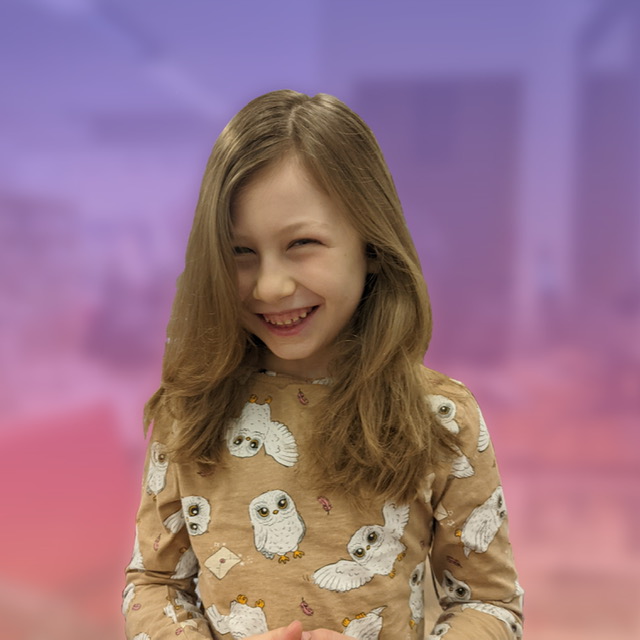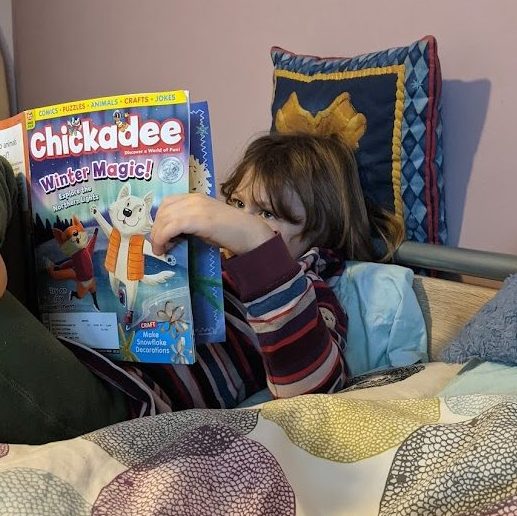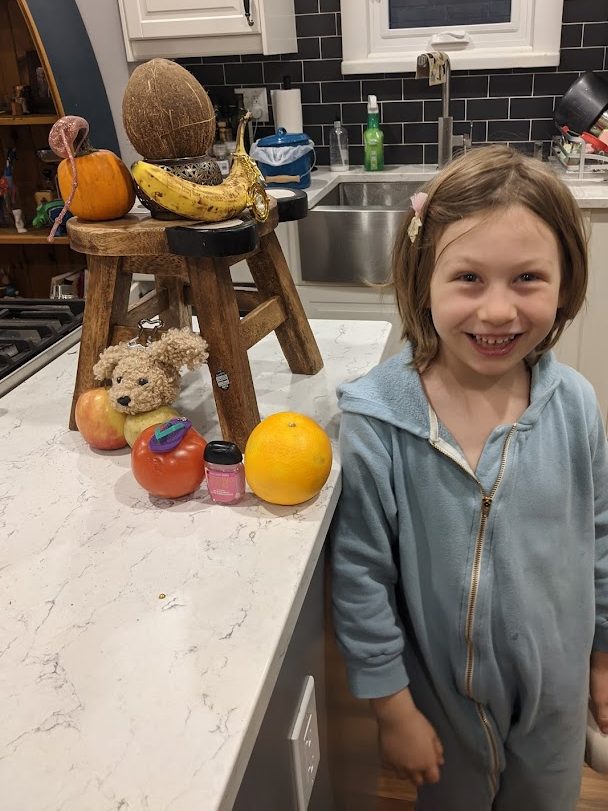Eulogy delivered on Sunday March 13, 2022 (a video of the service is here)
–forever her mommy and daddy, Sari Stillman and George Roter
As the sun rose and rays of light crept in the window, our daughter Aliyah Davida Elena Rotman was born on June 7, 2014. She died as the sun set on March 9, 2022.
Aliyah is a hebrew, arabic and farsi word meaning to ascend or go up. Our central wish for her life was that she ascended to her highest self. And she did. She was a stunning human being.
Davida is the name of my late aunt who followed her passion and did what was right and good and didn’t care what others thought. My goodness that was how our daughter lived.
Elena means to shine a light. We raised a lovely human being, who through empathy and optimism shined a fantastic light on people and the world around her.
And finally, her surname Rotman. She was very much part Sari and part George, part Stillman and part Roter.
Aliyah Davida Elena Rotman lived every bit of the name we chose for her. We are so proud of her, and we told her that each and every day.

Aliyah packed as much into 2,832 days as many people do in a lifetime.
She lived in Berlin and in Toronto, and she has a community in each. She loved language, and in addition to English she spoke and understood German, French and a little Hebrew.
She visited dozens of countries and cities on 4 continents. She was very proud to be Canadian. And she absolutely loved being Jewish.
She lived fully every single day.
She danced and sang every day.
She played sports every day — Basketball, Skating, Tennis, Soccer, Rockclimbing, Trampolining, Canoeing and of course her three favourites, Skiing, Swimming, and Biking. Today she would have had her first surfing lesson in Mexico.
She thanked people and was grateful for every day.
She appreciated nature and the outdoors every day.
She was quirky and different every day.
She laughed every day.
She smiled every day.
She cared deeply for the people and animals around her every day.
She thought deeply about the world and how it worked, and often how it was unjust and unfair and needed her to fix it, every day.
She savoured food and flavours of any dish you put in front of her every day.
She created stories, games, new ways to play and be silly every day.
She approached the world around her with wonder and delight every day.
She lived fully every single day
She had a big big heart.
She loved every single day.

Three meaningful gifts as Aliyah died
We stand here devastated. As many of you are, we’re feeling around in the darkness for answers that don’t exist. It’s hard to accept that she won’t be at home tonight or at school tomorrow. And so, we can’t help but search for meaning in her life and in her death.
She died of a very rare vascular condition, uncovered by a routine procedure that set the course for the final 2 days of her life. In these two days she was cared for by an extraordinary team of health professionals. They treated her with such humanity and kindness, right until the end.
We watched her nurse Denise surround her with her stuffies. We watched her doctors Andrew and Lennox, her respiratory therapist Fatima, her nurses Marlee and Pam touch her gently and reassure her and explain what they were doing, even after it was clear she could no longer hear them. We watched nurses, paramedics, surgeons, dentists, assistants, and so many others, including Aisha and her team, come together heroically to care for her and to give her a chance at a longer life. We watched her nurse Carey lovingly wash her hair and body so that we could snuggle beside her and feel the rise and fall of her chest, the warmth of her body, one more time.
Each and every one of these health professionals worked together to give us three incredible gifts. Gifts that have enduring meaning.
They gave us hope. While we had honest conversations early on about the likely outcome, nobody ever gave up on Aliyah. That slim ray of hope was a gift that sustained us.
They gave us time. They gave us an extra two days of singing to our daughter, dancing for her, telling stories to her, reading her favourite books, holding her, kissing her, and telling her we loved her. Two more days of being with Aliyah. We know now, we constitutionally feel it like never before, how precious time is.
Finally, they gave us life. Aliyah’s heart is beating right now in the chest of a little boy in Toronto. Her kidneys have allowed two others in Ontario to be freed from dialysis. Her beautiful hair will be made into wigs for children going through chemotherapy. It was the skill and resolve of every one of Aliyah’s health professionals that allowed her to live long enough so that her death would give life to others.
Sari and I are forever indebted for these gifts. Thank you for giving meaning to her final days.
Seeking meaning: Courage and perseverance
We have also sought meaning in her too short life. We’d like to tell you a few stories that exemplify her courage and perseverance, her joy and appreciation, her creativity and sense of self, and her activism and humility.
Aliyah was extraordinary in so many ways, but like all kids and all people, she struggled too. While some things came natural – swimming and play and dancing and stories – she really struggled with other things. Had to work really hard to learn how to print and cut, but when she put her mind to it she was unstoppable. Halfway through grade 2 she could already write cursive.
Reading was really hard for her. We don’t quite know why, but she really struggled with reading. She worked at it, sometimes begrudgingly, but she worked at it. Slowly the sounds and words started falling into place for her.
In February, Aliyah got her first library card. She was finally at a place where books felt a bit less scary and intimidating. Together, we would choose books she would read, and books we would read to her. Two weeks ago, as George and I were making dinner, we glanced over to the couch and smiled with pride as Aliyah was reading to herself, on her own, no prompting from us. We both felt a happiness knowing that soon a whole new world of stories was about to open up to Aliyah. My heart melted and I felt pride in her persistence, and knowing just then it was going to be okay.

We just recently shared with Aliyah that she was autistic, something we only learned last spring. We talked about this as her superhero abilities, and how this helped her excel. But some areas were tougher, like fire drills and connecting with classmates. We read about Greta and talked about how alike they were, we used her as an example to show Aliyah that there were no boundaries and that while this was part of who she was, this didn’t need to define her.
Aliyah quickly told us that she needed to advocate for herself and share what she had just learned with her class. George and I were hesitant to have her share this, not knowing if this would make it hard for her classmates to understand or accept her. But it was her courage that came through, as it always did, to have tough conversations rather than shy away.
When she shared with her class that she was autistic and what that meant, one of her classmates asked if she could hear the principal, Ms. Lee, in her office a floor down and on the other side of the school. What courage that must have taken to stand in front of her classmates, to open herself up and fully share who she was with those around her.
We’re all faced with moments when we can choose to be courageous, to do the thing that scares us a bit, to have tough conversations, to work at something even when it’s really hard. Maybe each of us when faced with these moments in the future can step back and ask “what would Aliyah do?” and that will give us the courage we need.
Seeking meaning: Joy and appreciation
When Aliyah walked outside each morning she would often take a moment to stop, take a deep breath in, and smell the world. And then she would turn to me and say: Daddy, smell the trees. Or Daddy, smell the soil. Or Daddy, smell the air. It smells so good.
She went through the world with such a deep appreciation for being alive. For spending time with her family, her friends, people she’s known forever, and people she met for the very first time. For smelling and experiencing and touching everything around her.
And this caused her to move through the world with such incredible joy.
This past fall, as COVID restrictions lessened, our friends Boris and Alana hosted a veggie roast at their home. It was Friday night and while we were biking home from school I asked her if she wanted to go to the party, not sure if she’d be up for it after a long school week. I remember her face lighting up with pure joy. “Of course Daddy.” She loved parties – birthday parties, street parties, parties at school – she loved parties. And she was always up for anything. I’m not sure why I expected differently.
We arrived and she disappeared into a house full of people who she basically didn’t know. I listened with such pride as she exclaimed the food was delicious and went around thanking the people who made each dish. I watched with such pride as she moved from adult to adult for conversations full of curiosity, and as she sat down for a game of chess with Boris’ son Kian, and as she bashed in a Pinata. And then I watched with the wonder and pride only a parent can feel as Aliyah organised all of the kids at the party to sort all of the candy they collected from the Pinata, so that the kids could together ensure each of them got what they wanted, so that it was equitable. She was always so kind and concerned about others.
She left making plans to host the next party, postponed to a Purim-party later this month. Aliyah loved bringing joy to others.
The community that is here today, and watching online from elsewhere in Canada, Berlin, Sweden, Denmark, Spain, Israel, or the United States, or anywhere else, is a testament to what it means to live with joy and to light up the spaces we move through. Even for those who never met Aliyah – they feel her joy through our eyes or those of her Buby, Baba and Papas, her aunts and uncles and cousins. Or parents who experience her joy through the stories of their children.
It’s hard to sit in that joy today, to appreciate anything at all about this moment. But we must, because that’s what Aliyah would have wanted and what she would have found a way to bring on this day.

Seeking meaning: Creativity and sense of self
We’ve all heard the cliche, dance like there’s no one watching. Aliyah did. It didn’t matter if it was the back of the classroom, at recess, in the streets, or at the dinner table. There wasn’t a day in the past years where we didn’t get the pleasure of her singing and elaborate choreography, or sometimes just feeling the music flow through her and let it move her.
She was her own person. She had her own ideas, and they were big, they were elaborate, and they were creative. And it was a fun challenge trying to help her bring her big visions to life.
This was always the case around Halloween each year. Aliyah loved Halloween. She loved dressing up. Her costume choices were her own. Powerdog the fuzzy rainbow magical dog. A spiderbat. Don’t worry if you’ve never heard of these – they come from her imagination.
If you ever stepped inside our house, there was action everywhere. Anything and everything was a character. Everything had a story. Toys, utensils, fruit and veggies, furniture, plants. When Aliyah looked at the world, she saw stories and relationships. Dare you peel a banana from the fruit bowl, the pen lying on the counter would be upset because you just took the coat off his friend in the middle of a snowstorm.
George used to joke that Aliyah had more creative thoughts and ideas in a day than any of us had in a year. Aliyah’s creativity was endless.

So many of us go through life holding back bits of ourselves. Not taking risks with our wild ideas. Aliyah taught us to live life so that we have no regrets, because she sure didn’t.
Seeking meaning: Activism and humility
Aliyah had a deep and intuitive sense of what was good and what was right. She was clued into what was going on, far outside her own life. She cared about people and the state of the world, and she cared so much it would often cause her a great deal of stress. Most recently, she was very concerned about the war in Ukraine. And the climate crisis made her heart ache. A pre-kindergarten teacher once told us that she felt Aliyah was carrying the weight of the world on her shoulders. At age four.
This was our Aliyah. For her, understanding and caring wasn’t enough though. She felt deeply compelled to do something. In Judaism, this is called tikkun olam – repairing the world. From her actions in the past few years, it’s so clear that repairing the world would have been her life’s work.
Her current passions were environmentalism and gender equity.

Almost exactly a year ago Aliyah came home upset. She pulled out of her bag a March Madness bracket pool being organised at her school, Jackman Junior Public School. For those who don’t know, this is for college basketball in the United States and people have challenges where each person submits their guesses for the winners of dozens of games up to the final.
Aliyah was upset because there were only men’s teams part of this challenge. Are there no women’s teams she asked? Is there no women’s March Madness? I’m embarrassed to say I had to look it up – yes, there is a women’s bracket, but it wasn’t included as part of the challenge. We finished the conversation and she was upset all evening and had trouble going to sleep.
The next day in the early afternoon Sari, who is a teacher in Aliyah’s school, sent me a recording of an announcement at the school. It explained how having only the men’s tournament didn’t live up to the equity values of the school, and that it was Aliyah Rotman in Grade 1 who advocated for a change to also include the women’s bracket. Aliyah had sought out the equity club lead for the school that morning to explain the situation and ask why it was that way, and they both got in touch with the principal. In a school of nearly 700 kids and staff, it was 6 year old Aliyah who saw the inequity, spoke up, and made a change. Sari and I had nothing to do with it, we didn’t even know it was happening. Aliyah just did it – that’s who our kid was.
For me the remarkable part of this story came next. She was deeply embarrassed by being named in the announcement to the school and by the congratulations she received afterward from her class. She was even embarrassed when Sari and I told her how proud we were when she came home that afternoon. When we asked why, she explained that it wasn’t her who mattered, it was the women’s basketball players. I think it takes some people a lifetime to reach that depth of humility.
Aliyah had plans to plant lots of trees. She loved nature and knew that trees could help with climate change. She planned to organise her school first, then other schools through kids on our street, and then all the schools in the city. I remember her asking, Daddy, do you think I could plant a million trees? I have no doubt she would have done it.
She was saving her allowance to buy and plant the first of the trees this spring.
We’re going to get started for her. Today.
On your way from the cemetery, or out of the chapel if you’re not going to the cemetery, you can pick up a sapling. We have 250 saplings today thanks to our wonderful friends Karyn, Ken and Jamie, and their daughter Rowan, who is one of Aliyah’s very best friends and who she loved deeply. Attached to each sapling are instructions and a passage from one of Aliyah’s favourite books, The Lorax by Dr. Seuss.
“Now that you’re here,
The word of the Lorax seems perfectly clear.
UNLESS someone like you
cares a whole awful lot,
nothing is going to get better.
It’s not.
It’s a Truffala Seed.
It’s the last one of all!
You’re in charge of the last of the Truffula Seeds.
And Truffula Trees are what everyone needs.
Plant a new Truffula. Treat it with care.
Give it clean water. And feed it fresh air.
Grow a forest. Protect it from axes that hack.
Then the Lorax
and all of his friends
may come back.”
Let’s all care a whole awful lot like Aliyah did, and begin her work of planting trees all over the world these coming months.
Aliyah was exceptional. And we hope that some of what we’ve shared can help bring even more meaning to her too-short life.
Dearest Aliyah. We love you. We have been so grateful to have you as our daughter. We are better human beings because of what you taught us, how we saw the world through your eyes, and who you were. You’ve shown us what it truly means to love and be loved, every day.
Aliyah, we love you.


